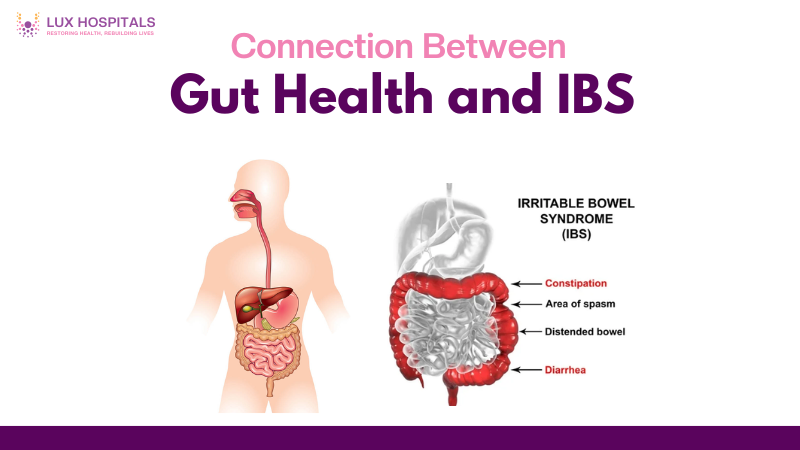IBS and Gut Health: Understanding the Connection and Finding Relief

Your gut has a considerably greater impact on your health than just digesting food. It’s home to trillions of microorganisms that influence everything from immunity to mood to energy levels. When this delicate ecosystem is disrupted, issues like IBS (Irritable Bowel Syndrome) often follow.
In this blog, we’ll explore the powerful connection between gut health and IBS, explore gut-friendly foods and supplements, and discuss simple ways to improve gut health for a happier, healthier life.
Understanding the Link Between Gut Health and IBS
Abdominal discomfort, bloating, constipation, diarrhea, or a combination of these symptoms are frequent symptoms of IBS, a digestive illness. While the exact cause of IBS is uncertain, one thing is certain: symptoms of IBS are frequently made worse by poor gut health.
When your gut microbiome — the community of bacteria living in your digestive tract becomes imbalanced, it can trigger inflammation, alter gut motility, and heighten sensitivity, all contributing to IBS. Strengthening your gut health can significantly improve IBS symptoms and reduce their frequency and severity.
Improving your gut health and IBS symptoms isn’t about drastic changes; it’s about making consistent, gut-friendly daily choices.
Gut Health Foods to Support IBS Relief
Your diet has a major impact on nurturing your gut microbiome. Choosing the right gut health foods can help calm inflammation, regulate digestion, and balance your intestinal bacteria, making a real difference in how you feel.
Here are some powerful gut health foods to add to your diet:
- Fiber-rich foods: Oats, chia seeds, flaxseeds, and lentils support healthy digestion and regular bowel movements.
- Probiotic foods: Yogurt, kefir, sauerkraut, and kimchi introduce beneficial bacteria into your gut.
- Prebiotic foods: Garlic, onions, asparagus, and bananas act To provide food to beneficial microorganisms and support their growth.
- Anti-inflammatory foods: Fatty fish like salmon, berries, and leafy greens can reduce gut inflammation.
By incorporating more gut-health foods into your diet, you take direct steps to improve gut health and ease IBS symptoms.
How Gut Health Supplements Can Help?
Sometimes, food alone isn’t enough. That’s where gut health supplements come in. These can provide targeted support to strengthen your microbiome and soothe an irritated digestive system.
Some effective gut health supplements include:
- Probiotics: Specific strains like Lactobacillus and Bifidobacterium are proven to help manage IBS symptoms.
- Prebiotic fibers: Supplements like inulin and psyllium feed your gut bacteria and promote balance.
- Digestive enzymes : can help break down hard-to-digest foods, reducing bloating and discomfort.
- L-glutamine: An amino acid that helps protect and repair the gut lining.
If you’re considering gut health supplements, The best course of action is to speak with a healthcare professional who can advise you on the appropriate kinds and dosages.
Tips to Improve Gut Health and Manage IBS Naturally
Taking charge of your gut health and IBS doesn’t have to be complicated. Small, sustainable habits can lead to lasting improvements. To enhance gut health, try these natural methods:
- Consume a variety of plant-based foods to encourage the diversity of your gut flora.
- Drink plenty of water because it aids in digestion and keeps constipation at bay.
- Regular exercise promotes healthy intestinal motility and lowers inflammation.
- Reduce stress: The gut-brain axis can be calmed by yoga, meditation, and deep breathing.
- Get enough sleep: A good night’s sleep allows your gut to rest and reset.
Each positive change you make supports a healthy microbiome, leading to better management of both gut health and IBS.
IBS and Gut Health: When to Seek Help?
While many people can manage their IBS symptoms through diet, lifestyle, and gut health supplements, it’s essential to seek medical advice if:
- Your symptoms are severe or worsening
- You experience unexpected weight loss
- There’s blood in your stool
- Over-the-counter treatments aren’t helping
You can better manage IBS and gut health issues by creating a customized strategy with the assistance of a healthcare professional.
Conclusion
There is no denying the link between IBS and gut health. Enhancing your gut health can improve your general energy, immunity, and mood while also lessening the distressing symptoms of IBS. By making mindful choices—eating gut-healthy foods, considering gut-health supplements, and embracing habits that improve gut health—you can empower your digestive system and regain control of your well-being.
Frequently Asked Questions
Yes, gut health is closely related to IBS. An imbalance in the bacterial community, or gut microbiome in your digestive system, can trigger or worsen IBS symptoms like bloating, constipation, and diarrhea. Improving gut health through diet, probiotics, and lifestyle changes can help manage IBS symptoms.
Gut health and IBS are closely connected because A gut microbiota imbalance may cause or worsen IBS symptoms like bloating, diarrhea, constipation, and abdominal pain. Strengthening gut health through diet, lifestyle, and sometimes gut health supplements can help manage and reduce these symptoms.
Currently, there is no permanent cure for IBS. However, symptoms can be effectively managed through dietary changes, stress management, probiotics, and medications. Working together with a medical professional to create a personalized treatment plan can significantly improve symptoms and quality of life.
Foods that improve gut health and IBS symptoms include fiber-rich foods like oats and chia seeds, Two examples of probiotic foods are kimchi and yogurt. , while onions and garlic are examples of prebiotic foods. These gut health foods support a balanced microbiome and can reduce gut inflammation.
Eating a variety of plant-based foods, drinking plenty of water, exercising frequently, controlling your stress, and getting enough sleep are all natural ways to enhance gut health. These easy routines can have a significant impact on gut health and IBS management.





















